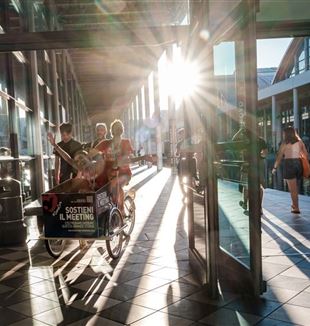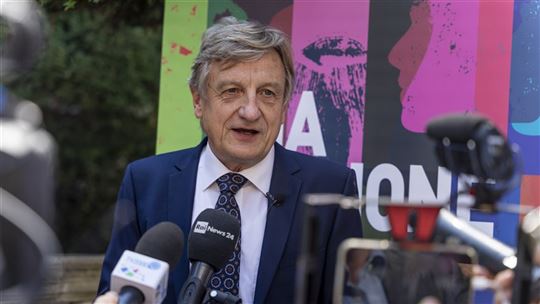
Towards the Meeting: friendship radiates the world
"Friendship is a gift from God that goes before us, so it is inexhaustible. And it has a very strong cultural impact." An interview with Bernhard Scholz, President of the Rimini Meeting, in the August issue of Tracce."The origin is the centenary of Fr. Giussani. The human passion that he communicated to us was a source of friendship, it generated relationships that we still live today. And they are friendships that expand, give birth to other bonds. Here, we would like to get to the bottom of this experience. To better understand how God's passion for the person, through his witnesses, generates this form of friendship, which is so much needed today." Bernhard Scholz, president of the Rimini Meeting Foundation, starts from this when explaining the title of the upcoming edition (August 20-25), from the root, from what makes possible that phrase of Giussani’s chosen as the theme of the Meeting: "Human existence is an inexhaustible friendship." What is most surprising is the final adjective: why and how can it be inexhaustible? "The word 'friendship' has had an imposing appeal through time, from Aristotle to Cicero. All of antiquity celebrated it," Scholz observes, "But they spoke of it, after all, as a moral commitment. This title says something different: already insofar as we exist we are invested with a friendship that precedes us, nurtures us, wants to expand and involve the world more and more."
In what sense is existence itself friendship?
Friendship is first and foremost God who has made himself our friend. And He wants us to respond, He desires that this friendship – which stems from Him and leads to Him – becomes a bond of reciprocity among people. We cannot separate the two: the source of true friendship among people is friendship with God. Realizing this has a very strong cultural impact.
Why?
That God tells us "I no longer call you servants, but friends" is a revolution: unparalleled freedom and tenderness. Think also of how many cultures have the family, blood ties at their centre. It is a very important thing. But this friendship brought by God goes beyond that, it also values family ties, but it goes beyond them, it reaches out to everyone and unites everyone. We wanted to invite people to the Meeting who witness this kind of relationship.
The Meeting carries friendship in its DNA: it was born from a group of friends who wanted to share their faith experience. How does this dynamic challenge you today?
True, it was born out of friendship, more than 40 years ago. And even today it would be unimaginable without it: the Meeting is born every year from a network of friendships. All the initiatives, from exhibitions to conferences, from shows to the catering start from there, from that network of relationships. Having friendship in our DNA, as you say, pushes us to be more and more authentic in living it. It is the opposite of comradeship. It is about challenging each other to get to the bottom of issues, to look for the best thing, the truest and most appropriate solution.
The word also features in your business name, the "Meeting for Friendship Among Peoples." Until recently, it might have seemed a somewhat obsolete formula, linked to the context of the 1980s, but perhaps today we realize how relevant it is...
Actually, I think it is actually a bit of a prophecy. In a world full of loneliness and violence, like today’s, it suggests that it is possible to live differently. You can live relationships with a deep respect for the other and, at the same time, with a real tension towards the truth, mine and the other's.
What is the difference between friendship and dialogue?
Dialogue is essence of life. Prayer, work, are a dialogue with God and the world. But I would say that friendship, in a sense, is the affective expression of this dialogue. I am in dialogue with the other, but if I live it in friendship, I give it true meaning, true expression even affectively. I could also experience it impersonally, at a distance, but friendship is something else. So much so that many dialogues that arise at the Meeting then become lasting bonds. And in them the dialogue also deepens because you begin to address topics that you would not otherwise address.
In what sense?
At the Meeting we can ask questions that reach out to the person as a subject. If we talk about economics, for example, we talk mainly about the people who create economies: with what criteria, values, hope do they do it? Or if we talk about politics, we want to understand who the subject is who does politics. And so on and so forth. Here, usually, one enters and feels immediately welcomed, does not need to defend anything. And this leads to implicating oneself in dialogues at levels that would otherwise be difficult to achieve.
There is another factor that is suggested in the Meeting’s title. Friendship "happens," but at the same time it belongs to our nature, we "are" friendship. What changes when we realize this?
True, friendship happens. But while it happens, I realize that it is a gift. Because I do not make friendship: I welcome it as a gift, with gratitude. And as something that empowers me. This leads us to discover our own life as a gift. The fact that I am given and the other is given to me leads to the big question: who? Who gave me myself and who gave me the other? That is where we get to inexhaustible friendship. You realize that it is the source itself that is inexhaustible. The relationship, in itself, is not, but what makes it be is. Otherwise we end up deluding ourselves that we can always draw from our own relational capacities... No. In friendship there is something that comes before, precedes me. Understanding that I myself, like the other, am "given," opens up truly infinite horizons.
How will this be explored in this Meeting?
For example in the opening show, Monsieur Ibrahim and the Flowers of the Koran, by Eric-Emmanuel Schmitt. It speaks of the friendship between an old Arab man and a young Jewish man and tells us that when there is a relationship of deep mutual affection, life begins to blossom and even cultural barriers can be overcome. Then, continuing with the shows, there are Giovanni Testori's Maddalene. The Maddalene is a genuine, I would say brilliant, approach to precisely that friendship that God establishes with man. It is an embrace, always and in any condition. Testori's own friendship with Fr. Giussani was a great testimony, to be rediscovered. We will also get to know more about Dorothy Day, Blessed José Gregorio Hernandez of Venezuela and other people from the past and present who have experienced or are experiencing a friendship that is contagious to so many.
Other themes, including the exhibitions and meetings?
A major theme will be work, especially how one lives it. Things change completely whether I experience it relationally or individually, as a vocation or as an obligation. If work is an expression of friendship, it truly becomes a contribution to the good of society. If friendship is lived authentically even by a few, it tends in itself to become a social friendship. This is the great theme of Pope Francis. We will also talk about it with respect to our cities, with an exhibition and meetings: urban planning is not neutral, it either helps or hinders relationship.
What about science?
There are exhibitions and meetings on the relationship between the human and nature. It is another fundamental theme: do I conceive of myself in relation to a nature that has been entrusted to me, or do I imagine myself as a master who has everything at my disposal? But in all these themes we discover that there is an even deeper landing point.
Which is?
These are problems of such complexity that no one can tackle them alone; it is the sheer scale of the challenges that requires us to work together. But this cannot be done without having a common goal. Sharing the horizons we want to explore will be one of the cornerstones of the Meeting. Coming together "for" is a fundamental perspective. It implies overcoming sterile oppositions to say what are we really interested in.
You have already talked about politics without talking about it...
True. But we will have many guests to discuss that as well. For example, the European elections are next year. But what keeps us together? We will also address the topic of the future of democracy. If it is not lived as a relationship, if it is not supported by the fact that each person – by living – contributes to the good of all, democracy becomes more and more fragile. And authoritarianisms are born, which we unfortunately see appearing more and more.
In this context, what does it mean to carry out "the prophecy for peace," as Francis asks us to do?
First of all, to witness that it is possible to dialogue even if one belongs to different cultures or positions. Of course, peace is a gift. And it is something that cannot be "done" regardless of the people involved, especially in times of such atrocious wars. I am referring to Ukraine, but not only. At the Meeting, for example, we will talk a lot about Africa, where there are conflicts of unprecedented brutality... Violence has never been the solution. Clearly, one must defend oneself against violence and aggression. But conflicts are overcome only in respect for the other that grows through encounter, education and witness.
Read also - At the root of true friendship
Are there any relationships you have seen come into being over the years that best exemplify what you are telling?
For example, certain friendships that have arisen with the Muslim world. Relationships with certain leaders has deepened a lot. I think of Muhammad Al-Issa, the leader of the World Muslim League, who invited me to R20, the summit of religions in Bali, or the leaders of the Sharjah Book Fair. But I also think of several authors or scientists who, after being at the Meeting for the first time, come back because a relationship was born. Last but not least, there are many partners who not only support the Meeting, but have become friends with it and help build exhibitions, meetings. They do this because they are fond of it and become attached to it. And often, among other things, they also end up becoming friends.